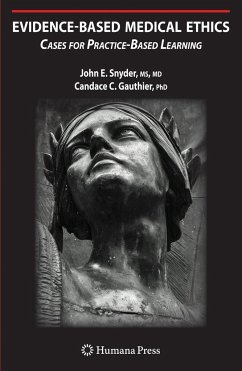In the modern practice of medicine, new challenges complicate the ethical care of patients. Today's times require a contemporary take on the concept of medical ethics. The idea for this textbook was born out of a need for a teaching resource that merges medical ethics theory with the practical needs of modern clinical medicine. In Evidence-Based Medical Ethics: Cases for Practice-Based Learning, the authors address what has been missing in existing text books and ethics courses to date - clear-cut ethical and legal guidelines that provide a method for the reader to learn how to systematically manage dilemmas seen in the everyday practice of medicine. The reader is guided through several "typical" patient scenarios and prompted by various questions that should be entertained by the treating health care provider. Then, relevant evidence-based medicine, legal precedent, and the ethical theory that applies to the situation are revealed. Often, finding the "best" ethical solution for each problem is automatic, as the solution often becomes self-evident during information-gathering. This general method is reinforced throughout the text with multiple different cases, using a practice-based approach by building on the reader's developing skills. Additionally, we have sought to emphasize a culturally competent manner in resolving these dilemmas, respectfully addressing issues of age, gender, and culture whenever possible. The main goal of Evidence-Based Medical Ethics: Cases for Practice-Bases Learning is to assist the reader in adapting a patient-centered and evidence-based approach to dilemmas faced in their future practice of medicine.
From the reviews:
"Fictional case records that encapsulate many of the problems encountered frequently by comprehensive therapists become the basis for this nice, inexpensive, little manual. ... It becomes an easy reading monograph that can be appropriately sampled as time permits and will spare time when similar cases are encountered in clinical practice." (William H Wehrmacher, Comprehensive Therapy, December, 2008)
"This is the newest addition to case-based clinical ethics books. ... the purpose of this book is `to provide a method for the reader to learn how to systematically manage dilemmas seen in the everyday practice of medicine.' The authors ... have several audiences in mind for the book: medical students and residents, nursing students, undergraduate and graduate medical ethics courses, as well as clinicians." (Michele K. Langowski, Doody's Review Service, November, 2008)
"Synder and Gauthier have taken a very interesting, and surprisingly seductive, approach to teaching medical ethics. ... the book would be a valuable addition to many bookshelves." (Ruth Wilkinson, Public Health Ethics, January, 2009)
"Fictional case records that encapsulate many of the problems encountered frequently by comprehensive therapists become the basis for this nice, inexpensive, little manual. ... It becomes an easy reading monograph that can be appropriately sampled as time permits and will spare time when similar cases are encountered in clinical practice." (William H Wehrmacher, Comprehensive Therapy, December, 2008)
"This is the newest addition to case-based clinical ethics books. ... the purpose of this book is `to provide a method for the reader to learn how to systematically manage dilemmas seen in the everyday practice of medicine.' The authors ... have several audiences in mind for the book: medical students and residents, nursing students, undergraduate and graduate medical ethics courses, as well as clinicians." (Michele K. Langowski, Doody's Review Service, November, 2008)
"Synder and Gauthier have taken a very interesting, and surprisingly seductive, approach to teaching medical ethics. ... the book would be a valuable addition to many bookshelves." (Ruth Wilkinson, Public Health Ethics, January, 2009)








